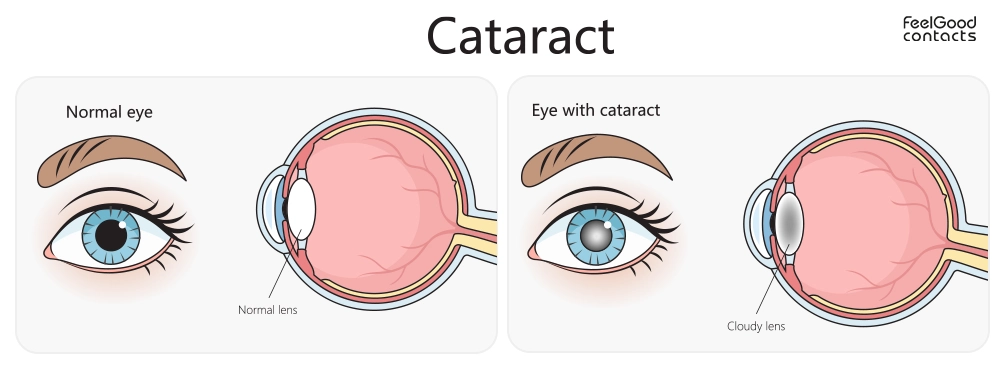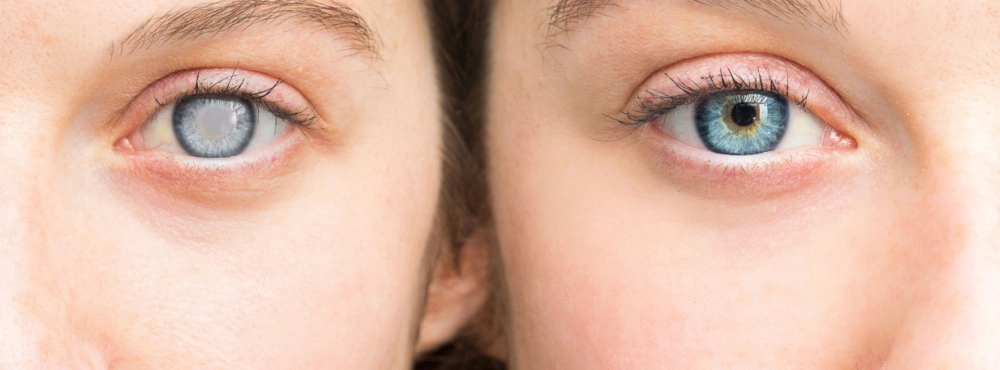Maintaining good eye health is crucial for promoting long-term vision and overall quality of life, particularly as we age. Cataracts are one of the most common age-related eye conditions, which cause the natural lens of the eye to become cloudy, leading to distorted or blurry vision. Those who are curious to learn what are cataracts and how they affect vision should go through this guide and discover everything about them, ranging from what causes cataracts to their treatment and cataract symptoms to their types.

A brief explanation of cataracts
Cataracts are an eye condition in which the lens, which is normally clear, becomes opaque due to the buildup of protein, hindering the passage of light and affecting vision. Affecting millions worldwide, cataracts develop gradually with age and may take years to start affecting vision. The progression of cataracts can vary from person to person, making it difficult to predict how quickly they'll develop. In some cases, cataracts may not even require treatment and people may continue to live with them without experiencing any significant vision loss.
Types of cataracts
Different types of cataracts include:
- Nuclear cataracts – This type of cataract affects the centre of the lens and can cause near-sightedness initially. However, the lens turns yellow over time, causing the vision to become cloudier.
- Cortical cataracts – This type of cataract begins with white streaks on the outer part of the lens cortex. As cataracts develop, the streaks extend to the centre of the lens, interfering with the light passing through it.
- Posterior subcapsular cataracts – This type of cataract usually starts as a small opaque area near the back of the lens. It can interfere with reading and may cause glare or halos around lights.
- Congenital cataracts – Some people are born with this type of cataract. The causes may include infections, such as chickenpox and rubella, which can be passed from mothers to their babies during pregnancy.
Cataract symptoms
Some of the most common signs and symptoms of cataracts include:
- Blurry vision – One of the signs of cataracts is blurry or cloudy vision. Objects can appear hazy or cloudy, like looking through a dirty windscreen or window.
- Sensitivity to light – Those with cataracts may experience an increased sensitivity to bright light, which can cause glare or discomfort. They may find themselves squinting more often or avoiding bright environments.
- Difficulty seeing at night – Cataracts can make it difficult to see in low-light conditions, such as at night. Driving at night or walking in dimly lit areas may also seem troublesome.
- Fading colours – Colours may appear dull or faded and a yellowish tint on the vision can be noticeable. This can affect the ability to distinguish between different colours, particularly shades of blue and purple.
- Double vision – One of the cataract symptoms is that it can cause double vision in one or both eyes, which means you see two images instead of one.
What causes cataracts?
The main cause of cataracts is the natural ageing process. As proteins within the crystalline lens clump together with age, it leads to clouding of the lens of the eye. However, other factors also contribute to cataract development, such as:
- Genetics: The family history of cataracts can increase the risk of developing them
- UVA/B radiation: Prolonged exposure to harmful UVA/B rays of the sun
- Medical conditions: Diabetes, hypertension or eye injuries
- Intake of certain medications: Long-term use of steroids or specific medications
Who is most likely to be affected by cataracts?
Although they are commonly seen in older adults, the risk factors for cataracts can also develop in children.
Age-related cataracts – Cataracts can typically start developing in individuals over 40 and become more noticeable after 60 years of age. As we age, the lenses of our eyes can start to become cloudy, impacting our ability to see. When we are young, the lens in our eyes is clear, allowing us to see things with clarity. However, with age, the proteins in the lens of our eyes start to break down and clump together, making the lenses cloudy. As time passes, the cataract becomes more severe, causing the lens to be clouded.
Childhood cataracts – Cataracts primarily occur in older adults, but babies can also be born with them. Children can also develop cataracts at an early age, which are referred to as childhood cataracts. According to the NHS, cataracts are relatively uncommon in babies and children. About 3 to 4 out of every 10,000 babies are born with cataracts in the UK.
Cataract treatment
Cataract surgery is the most common and effective treatment for cataracts. This eye surgery is a quick and easy procedure that can take 15-30 minutes. It involves a small incision in the eye to remove the cloudy lens and replace it with an intraocular lens. Typically performed as a day surgery under local anaesthesia, the patient can go home on the same day.
Frequently Asked Questions (FAQs)
How do you fix eye cataracts?
Cataracts can only be treated through eye surgery. Cataract surgery involves removing the cloudy lens and replacing it with an artificial intraocular lens (IOL). The procedure is safe and effective, with a high success rate in restoring clear vision.
How to prevent cataracts from getting worse?
While certain risk factors, such as age and genetics, are beyond anyone’s control, there are steps to reduce the risk of cataracts and slow their development:
- Always protect your eyes by wearing UVA/B-protected sunglasses that block harmful rays of the sun from reaching your eyes
- Maintain a healthy diet and make sure to have a sufficient intake of antioxidants like vitamins C and E
- Consult with your optician at regular intervals and get your eye tests done, as they can help in identifying cataracts in the early stage
- Manage underlying health conditions, such as diabetes and hypertension.
- Quit smoking, as tobacco increases the risk of developing cataracts
Disclaimer: The advice in this article is for informational purposes only and does not replace medical care or an in-person check-up. Please check with an eyecare professional before purchasing any products or remedies. For information on our article review process, please refer to our Editorial Policy.

 Offers
Offers Account
Account
 Favorite
Favorite
 Basket
Basket

 OFFERS
OFFERS

















